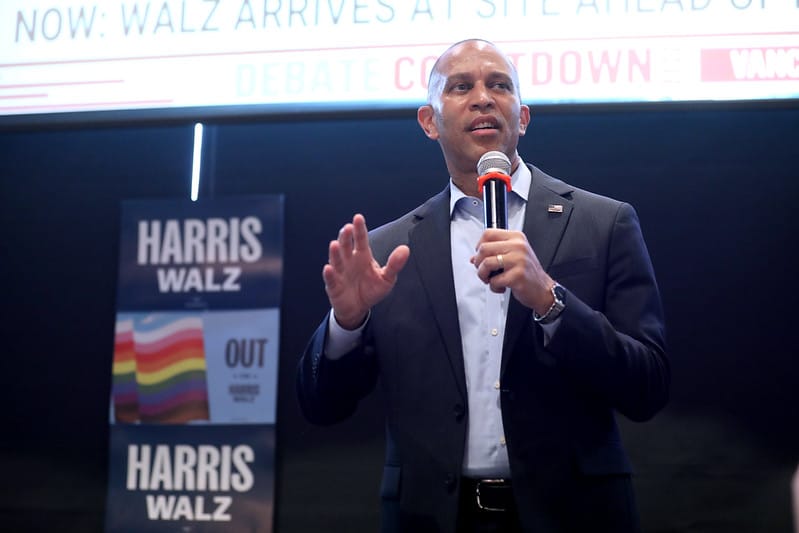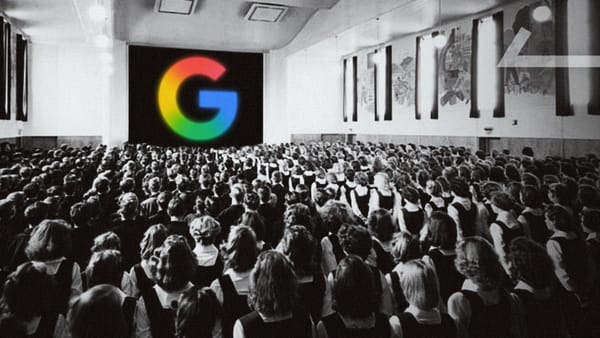Hakeem Jeffries Is a Disaster
House Democrats should fire the most ineffective party leader of the 21st century.

If it wasn't clear before last week, the crisis of American liberalism is everyone's problem. The crackdown on free speech that President Donald Trump escalated in the earliest days of his second term by targeting permanent residents, visa holders, and undocumented people has now extended to American citizens. Public employees have been fired for quoting Charlie Kirk after his murder, with the full backing of the Vice President of the United States and several Republican members of Congress. Trump advisor Laura Loomer, who considers Muslim Americans a "stain" on Congress, is leading a campaign of religious and racial bigotry against Rep. Ilhan Omar and other prominent American Muslims. Illinois congressional candidates nonviolently protesting ICE raids were body-slammed last week with the explicit approval of Fox News hosts.
Reaction has firmly taken hold and is tightening its grip; the Bannonite "flood the zone" strategy has done to American institutions what the West Coast offense did to the NFL in the 1980s. But Trump himself has not been this unpopular since he left the White House in disgrace in 2021, and it does not promise to get better for him anytime soon: the economy's full weight is on an AI bubble that could pop at any moment, the Trump administration is easily the most corrupt since at least Harding's, the Epstein scandal still looms large, and last week's dramatic overreach on free speech drove a genuine public wedge in Trump's coalition. The future is far from certain, but the opposition to Trump is very much alive yet if deeply disorganized.
It's under these conditions that we judge the performance of what should be one of the faces of Trump's opposition, House Democratic leader Hakeem Jeffries. Jeffries has not only been a failure, but is the most ineffective leader of either party in my lifetime. It is difficult to see a scenario in which the Democratic Party's reputation changes its downward trajectory without the House caucus very publicly firing him.
Jeffries ascended to the top of the Democratic caucus in 2023 with the blessing of former Speaker Nancy Pelosi. Jeffries was not Pelosi's first choice; that was Rep. Joe Crowley of New York, but Crowley's defeat to Alexandria Ocasio-Cortez in the 2018 House primary dramatically shifted the future of both the New York left and the internal politics of the House Democratic caucus. In stepped Jeffries, a moderate whose own politics had been, until then, defined by criminal justice reform and his (unusual even for Democrats) extreme support for Israel.
For the first two years of Jeffries's leadership, his ineffectiveness was obscured by the more public failures of former President Joe Biden and Senator Chuck Schumer, the Democratic Senate leader. But in the first nine months of Trump's second term, Jeffries has been exposed as clearly out of his depth in the populist moment. This is all the more remarkable when you consider that, unlike Schumer, Jeffries is not a relic of a more congenial D.C. but a 55-year-old who arrived in Congress in the middle of the Tea Party revolution.
The early stages of the upcoming shutdown fight made this clear. Schumer and Jeffries sent Trump a letter demanding a meeting, Trump agreed, and then on Tuesday, he abruptly cancelled it and called them unserious. Jeffries responded by saying Trump never uses his name (it's true, Trump has said Jeffries' name just three times this year in public) and referred back to his previous correspondence. Schumer told him to turn off the dang television. Are you convinced that they are serious?
There are three major ways Jeffries has failed, as I see it. The first is that while the public does not like Trump or the Republican Party, they like the Democratic Party even less. They like Democrats in Congress even less than that. Even more damning, a lot of these people still don't even know who Jeffries is. He is ostensibly supposed to be one of the party's most visible members, and he is a complete non-entity in the conversation. All they know about him is that they want someone else — in June, a poll found that 62 percent of Democratic voters want the party leadership replaced.
This lack of enthusiasm also shows up in the fundraising. In the 2018 midterms, the House Democrats' campaign arm, the DCCC, outraised the Republicans' (NRCC) by $70 million; at this point in the cycle, both campaigns have roughly raised the same amount, even though voters can't stand the one big Republican legislative accomplishment anyone knows about. The DCCC brought in $7 million in August; for comparison, populist Maine Senate candidate Graham Platner raised more than a third of that in the first month of his candidacy. Not to mention the party is still hemorrhaging voters to both the GOP and non-affiliated or independent registration. No one wants to be a Democrat.
Secondly, Jeffries (and Schumer) are unforgivably out of step with their base on Israel. Democratic support for Israel's "military action" in Gaza is in the single digits, but Jeffries is still among its most fanatical supporters in the House. It's widely understood to be a major factor in why he hasn't endorsed the Democratic nominee of his own city, to the annoyance of his caucus. When Jeffries' top deputy rightly called Israel's campaign a genocide last month, she almost immediately walked it back.
It's impossible to envision a truly anti-war Democratic Party, but the future of the country has made its opinion on this clear. If the leaders of the Democrats cannot articulate that it's immoral and stupid for the federal government to give $18 billion a year to its vassal state to massacre and displace innocent people, all while our healthcare system crumbles and record numbers of people are homeless, then they will continue to lose ground.
The third major reason Jeffries has failed is also one that makes clear why no one has publicly challenged him thus far: Jeffries refuses to ask his membership to make tough decisions, and he prioritizes incumbency over winning. Compare and contrast how Jeffries and Pelosi have handled the redistricting wars — while Pelosi was a prime mover in getting California Democrats on board with Gov. Gavin Newsom's response to Texas' mid-decade gerrymandering, this was Jeffries in Illinois:
"Jeffries privately met with members of the Illinois delegation on Tuesday to hear out their redistricting concerns, according to five people granted anonymity to share details of the discussion. Jeffries told them to keep all of their options open but acknowledged every Democratic member of the congressional delegation would need to buy in to a redraw before it could move forward, the people said."
They were not on board.
Jeffries' refusal thus far to endorse Mamdani is obviously linked to Palestine and his own members' pants-shitting over Republican messaging. But given everything we know about the Democratic leader, it's also easy to assume, as one anonymous Democrat suggested to Axios, that his reluctance is primarily motivated by the possibility that Mamdani could wield his emerging political machine to target moderate Democrats in New York like Rep. Dan Goldman or Jeffries himself. He and his staff have spent a frankly embarrassing amount of time warring with the New York City DSA, which is quickly becoming the most effective left-wing electoral machine in the country.
The examples of Illinois and New York City illustrate that many Democrats in Congress are far more worried about maintaining the incumbency racket than repairing their reputation and winning the majority, and Jeffries is one of their biggest enablers. Despite all of his faults, Democrats could very well ride into a House majority due to disenchantment with Trump, but none of the evidence bodes well for him to manage a caucus of 220 or 230 people with wildly different politics.
Jeffries and Schumer are the leaders of a party that no one wants to be at. And when Trump runs down the endless list of his political opponents, there's no shortage of Democrats in Congress on that list — Pelosi, Schumer, AOC, and Ilhan Omar, to name a few — yet Jeffries, as he noted himself, is almost never mentioned. It's up to the rest of the Democrats in the House to figure out what that means.


